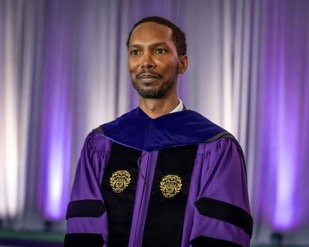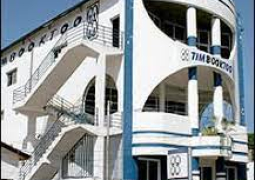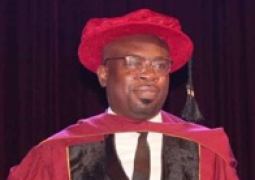
The academics say the attacks on Dr. Bah “constitute a clear assault on journalistic freedom [and] go to the heart of principles of academic freedom.”
The signatories include historians, anthropologists, archaeologists, sociologists, political scientists, economists and religious studies scholars from various universities in Brazil, the United States, India, South Africa, Zimbabwe, Portugal, and Nigeria.
“We call on the government of Sierra Leone and other political leaders in the country to extend all reasonable guarantees of safety from harm that could result from Dr. Bah’s pursuit of his research,” they said, adding that “Dr. Bah is both a scholar and an investigative journalist…[and] needs to be able to carry out his postdoctoral research in his home country without hindrance.”
Dr. Bah, an investigative journalist and historian, is a postdoctoral fellow at Northwestern University’s Chabraja Center for Historical Studies, where he completed his doctoral studies in history in the summer of 2023. Bah specializes in the medical, legal, and economic history of West Africa, and before pursuing doctoral studies at Northwestern, he had worked extensively in West Africa as a journalist, political activist, and writer. He is the author of The Ebola Outbreak in West Africa: Corporate Gangsters, Multinationals, and Rogue Politicians (2015), and Neocolonialism in West Africa: A Collection of Essays (2014).
The recent harassment stems from a multiyear investigation he led that produced more than 70 reports documenting large-scale financial crimes and corruption in Sierra Leone. The publications include unexplained wealth reports on Sierra Leonean government officials, including current president Julius Maada Bio and his spouse, who allegedly spent 7.89 billion Leones (US$615,000) of public funds on personal shopping, according to one of the reports. Another report also detailed how President Bio and First Lady Fatima Bio cumulatively withdrew over Le71.4 billion as international travel per diem in FY2022 violating the country’s legal procedures. The reports were published by the Africanist Press, a nonprofit organization of investigative journalists and academics established in December 2002 to report on corruption, human rights, and democratic governance in Africa. The Sierra Leone investigation has had far-reaching consequences and attracted international attention to the issues of democratic governance and financial corruption in that West African country.
Bah has an active following among West Africa’s youth population and is a critical voice among the emergent leadership generation in the region. He currently lives in exile in the United States, yet he continues to be an ongoing target of overt and covert harassment, including death threats, from various political groups in Sierra Leone for his research and publications exposing corruption in Sierra Leone.
In the last two decades, Africanist Press journalists and researchers have documented and reported on corruption, graft, and human rights issues across many African countries, including in Cameroon, Kenya, Guinea, Sierra Leone, and Nigeria.
Bah, a founding editor of the Africanist Press, has been central to the organization’s anti-corruption and human rights work in Africa for 20 years. In December 2023, he launched a new Voice from Exile podcast to commemorate the 21st anniversary of the Africanist Press.
“It’s a significant milestone in our ongoing effort to build an independent media agency dedicated to the promotion of democracy, accountability, and good governance across Africa,” he said.
Supported by Northwestern University’s Program of African Studies, the Africanist Press Podcast focuses on African issues and can be heard on Amazon, Apple, Castbox, iHeart Radio, Pocket Cast, Radio Public, Spotify, and other podcast platforms. Spotify accounts for about 55% of the followers in 75 countries, most of whom live in Sierra Leone, the US, and the UK. The WhatsApp platform accounts for a weekly distribution totaling 1.5 million people, including audiences in Sierra Leone, Guinea, The Gambia, Liberia, and Nigeria.
In early May 2022, Sierra Leone’s Office of National Security (ONS), a unit under the Office of the President, submitted a complaint to the Independent Media Commission, the country’s media regulator, accusing the Africanist Press of making “a deliberate attempt…to stir disaffection in the military,” which the ONS said could “cause unrest in the country.” The agency asked the commission to warn the news organization against “inciting publications.”
The ONS letter followed an Africanist Press report, published on Bah’s Facebook page, showing that the salaries of 30 officials in Sierra Leone’s finance ministry could cover the monthly earnings of 1,747 Sierra Leonean soldiers.
A day after the ONS letter, on 6 May 2022, Bah received a death threat in a Facebook direct message from a user who accused him of trying to “distract the real citizens of Sierra Leone.”
Two weeks later, on May 23, a Facebook group called the General Kalokoh Media Team posted that the Africanist Press should face prosecution for cybercrimes, accusing Bah of exposing “highly classified” data. The group, now numbering 4,200 members, states its purpose as “promoting the interest of the president,” an apparent reference to President Julius Maada Bio.
In late May 2022 also, Sorie Fofana, a member of the ruling Sierra Leone People’s Party and then chairman of the government-owned Sierra Leone Cable network’s board of directors, wrote in an opinion piece on the news site he publishes that authorities should treat Africanist Press reports as treason and said the news organization was run by “dissident elements.”
Fofana has since been appointed to Sierra Leone’s National Civil Registration Authority (NCRA) as board chairman.
“I have become the overt target of death threats and other attacks by known supporters of Sierra Leonean President, Julius Maada Bio, after I published financial and other public records showing how President Bio, the First Lady, and other senior officials in the Bio administration are looting and diverting public funds for their own private uses. Other leading opposition politicians in Sierra Leone have also joined this campaign of harassment against me, which has escalated since April 2021 to include calls for my extradition from the United States for prosecution in Sierra Leone,” Bah wrote in an essay published on the Africanist Press in August 2023.
Press freedom organizations, including the New York-based Committee to Protect Journalists and European-based Civil Forum for Asset Recovery (CiFAR), have also detailed Bah’s situation and called for Sierra Leonean authorities to denounce the escalating rhetoric and investigate the death threats against Bah.
The global letter of support from academics is the latest among a growing number of organizations and individuals concerned over Bah’s safety.
“The attacks have had a profound effect on Dr. Bah’s ability to continue his academic research. Not only have the attacks on Dr. Bah absorbed a tremendous amount of his time, but also, they have prevented him from returning to Sierra Leone to carry out additional archival and oral history research that is necessary for him to revise his work,” they emphasized.
Africanist Press editors say authorities have failed to stop the harassment and have instead escalated the attacks and amplified the threats. A published investigation in December 2022 uncovered that Sierra Leonean officials paid at least US$5 million to cyber intelligence groups, including the Israeli-based Cognyte Technologies Limited for cyber intelligence services and tools that were used to target Bah and the operations of his organization.
In August 2023, Bah also sent a letter of complaint to US Secretary of State, Anthony John Blinken reporting the ongoing attacks on Africanist Press and the threats he continues to face while living in the United States.
“The United States, as a leading partner of the government of Sierra Leone, has an obligation to ensure that its continuous engagement with the government of Sierra Leone involves safeguarding the fundamental rights of Sierra Leonean citizens, including the right to free speech and freedom of the press,” Bah noted in the letter.
The United States is one of Sierra Leone’s longstanding international partners. Africanist Press editors say strong political and economic ties exist between the US and Bio’s administration.
US-financed corporations have acquired control of critical infrastructure and service-related contracts in Sierra Leone’s energy, telecommunication, mining, health, and transportation sectors since Bio assumed power in 2018. The United States International Development Finance Corporation (DFC) alone approved over US$750 million in debt financing for Sierra Leone between June 2021 and July 2023, mostly for unvetted contracts awarded to US-financed corporations registered in Turkey, Lebanon, London, South Africa, and Kenya.
“Most of the contracts were acquired without compliance with Sierra Leone’s finance and transparency laws, including the fulfillment of competitive bidding and public tender processes and procedures,” one civil society activist said.
Africanist Press editors have submitted appeals to a number of human rights organizations asking them to impress upon US State Department officials in charge of US-Sierra Leone relations the need to protect free speech and academic freedom in Sierra Leone.
Academics can sign the letter of support for Dr. Bah by clicking here.
Read Other Articles In Feature

Tribute :The fall of a Gambian patriot and the loss of Mathew’s Mighty Pen
Jan 12, 2024, 12:17 PM

Commentary: Six decades of diplomatic relations: The Gambia and the United States
Jul 30, 2025, 2:06 PM



